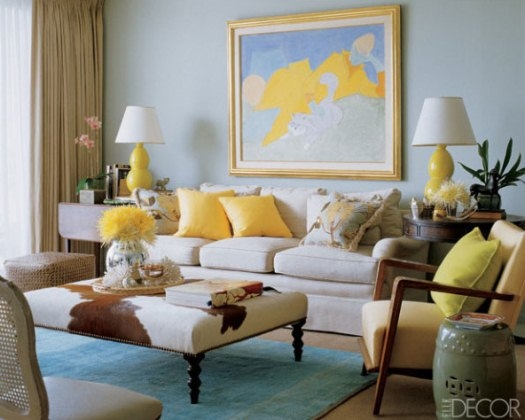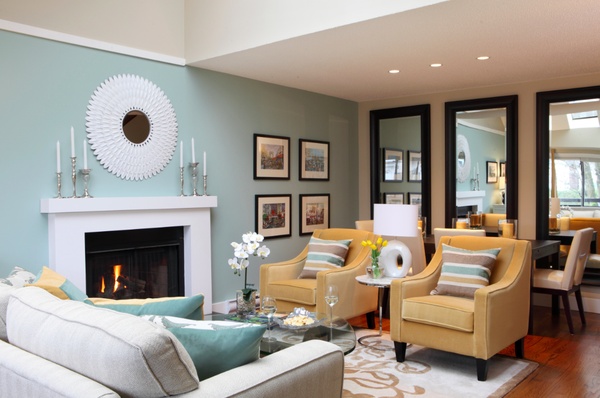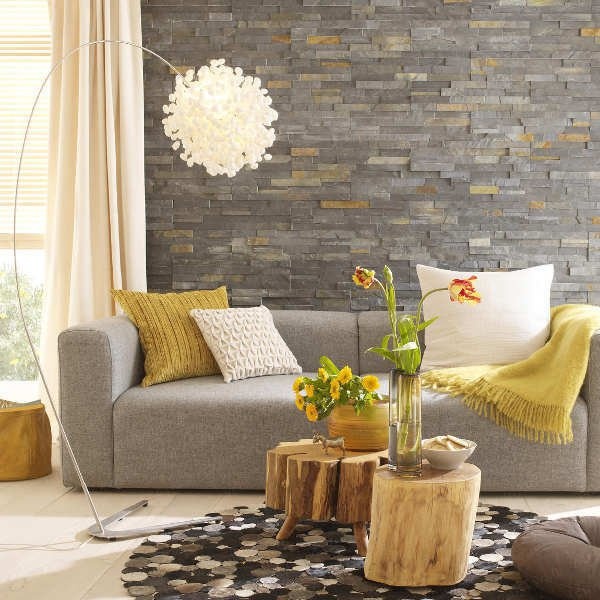It's a fact that in many of today's new home builds, either your living room or family room will be a smaller room. There are many things that can be done to help visually enlarge smaller spaces. There are ways to use darker colours and larger scale furniture in smaller spaces, but their successful use takes a trained eye. If you want to decorate a small room with confidence the following ideas are easily applied.
1. Choose light furniture with simple lines
Houzz
There's only one thing I would change in this room. With everything else so light , I find the darker wood of the table somewhat harsh. Something lighter would be more cohesive
Choose furniture first and look for pieces that are light in colour and have legs. Lighter colours occupy less visual weight and legs provide an unobstructed view of the floor, allowing the space to appear more open. Coffee and end tables in metal and glass also allow the eye to move through the pieces consuming little visual space while dark wood furniture has the opposite effect. The cow hide ottoman above works because it is overall light and has great legs. It also serves to connect the tones of the wood pieces in the room.
2. Choose a lighter colour scheme
Maria Killam
Neutral colours mixed with lighter shades of blue and green work well in a small living area. Cooler colours recede thus giving the impression of a larger space. . Use hints of brighter colors in accent rugs or pillows. The golden accents above warm up this space. Small spaces work best with a three-color (or less) palette as in the room above. If you love texture consider using a monochromatic scheme. Bare wood floors in lighter wood tones also add to a clean, flowing feeling. Dark floors have the opposite effect. Unfortunately the current trend for darker floors often causes many problems including closing in a space. The dark mirrors at the end of this space enlarge it. Which leads me to ...
3. Use mirrors effectively
Mirrors can make a small space look larger but it's not that simple. They function best by reflecting light. That can be the light colour of the wall or refleced light. Be aware of what gets reflected in your mirror by standing in different positions in the room. I have seen mirrors actually decrease visual space because they reflect the wrong things.
4. Emphasize vertical lines
We often forget that a room has a vertical axis. Add things to the space to encourage your eyes to move upward from the furniture. Floor lamps, large vases with tall twigs, full length draperies, long mirrors, vertical paintings or stacked paintings, mantles, tables with multi- layered arrangements etc. are possible choices.Did you notice the large mirror on the end wall?
5. Match the furniture to the scale of the room
If your room is small, choose smaller scale furniture. Armless chairs, apartment size sofas, small sectional etc. will make the room appear more spacious. Consider a bench rather than a conventional coffee table or a glass or lucite table as in #4 photo. Don't get carried away with this and end up with clutter by using too many small items.
6. Choose multifunctional furniture
One of the best ways to deal with limited space is to choose dual-purpose furniture, e.g., a pair of ottomans can double as coffee tables, with storage inside; coffee tables with a lower shelf can hold baskets, books, covered boxes for storage; consoles with doors make tidy hiding places, bookshelves used as a sofa table when you can't walk around the sofa, etc.
7. Build in storage
Give a small space character and maximum function with a bank of custom-built cabinets in a light colour. Built in cabinets and shelving triple storage options. Keeping the colour of built ins light will increase the visual space. Arrange objects on open shelves in an artful way. Leave lots of open space and vary the sizes and shapes of decorative objects.
8. Harmonize large pieces of furniture
If you have a sofa or sectional that you need to keep and it dominates the room, paint the walls a shade that is just a bit lighter than the upholstery . The eye will move across the room rather than sticking on the sofa. In the room above a stone wall harmonizes with the sofa and the warm yellow from the wall is picked up as accents.
9. Control clutter
Find interesting ways to store the objects that are needed in a room, e.g., storage cubes, baskets, covered decorative boxes, ottomans, etc. This room has a lovely wicker basket which serves as an end table. On the shelf is a fabric covered box and the coffee table has a lower shelf which can be used to store books, boxes, baskets etc.Sometimes the more space you have the more objects you accumulate. Keep shelving organized.
10. Layer lighting
Lighting is important in any room but even more so in a small room. Keep window treatments light and airy so that the natural light can shine through or have drapes that can be pulled back to let the light flood in. . For evenings or when there is minimal natural light use additional lighting to maximize each area of the room. A dark corner is a great place for a floor lamp or an accent table with a lamp for reading. Wall sconces take up little space and can be used to highlight a certain areas of a room. Lights over artwork add an additional layer of brightness and highlight the artwork. I try to have at least four levels of light in a room- natural light, dimable ceiling lights, floor lamp or sconces, and table lamps. Do a visual check to see if the four corners of your room have adequate light.
Many of these ideas will work in much larger rooms too. The most important thing to remember is to select furniture that is the right scale for the space you are decorating.










